12 oct 2018

Palestinian owned vehicles were damaged on Thursday near the intersection of the illegal Yitzhar settlement, south of Nablus, in the occupied West Bank.
Ma’an News Agency reported that illegal Israeli colonialist settlers threw rocks at Palestinian vehicles, and eyewitnesses said Israeli military checkpoints were erected in many areas of the district of Nablus. There, numerous Palestinians were subjected to extensive searches of their vehicles, and inspection of identification.
The additional checkpoints were supposedly in response to an attack on soldiers at the Huwwara checkpoint earlier on Thursday.
On Wednesday a group of illegal Israeli colonialist settlers invaded the village of Quryout, south of Nablus. The settlers, from a nearby settlement, in the southeastern part of Qaryout, punctured the tires of nine Palestinian cars, and wrote racist graffiti on Palestinian property.
Ghassan Daghlas, a Palestinian official monitoring Israel’s colonialist activities, stated that the settlers fled the village shortly after the incident. According to International law, all of the Jewish-only settlements built in occupied Palestine are illegal.
In a related incident on Wednesday, Israeli settlers invaded a high school in Urif village, in the southern Nablus district. The illegal colonialist setters threw stones at the students, while they were in class, causing injuries, disruption of classes, and damage to the school.
Ghassan Daghlas told Ma’an News Agency that 18 heavily armed settlers were escorted out of the vilage by Israeli military, who protected the settlers, while firing tear-gas bombs and rubber-coated steel bullets at the students.
These attacks caused the disruption of education, injury by tear-gas inhalation, and property damage.
Ma’an News Agency reported that illegal Israeli colonialist settlers threw rocks at Palestinian vehicles, and eyewitnesses said Israeli military checkpoints were erected in many areas of the district of Nablus. There, numerous Palestinians were subjected to extensive searches of their vehicles, and inspection of identification.
The additional checkpoints were supposedly in response to an attack on soldiers at the Huwwara checkpoint earlier on Thursday.
On Wednesday a group of illegal Israeli colonialist settlers invaded the village of Quryout, south of Nablus. The settlers, from a nearby settlement, in the southeastern part of Qaryout, punctured the tires of nine Palestinian cars, and wrote racist graffiti on Palestinian property.
Ghassan Daghlas, a Palestinian official monitoring Israel’s colonialist activities, stated that the settlers fled the village shortly after the incident. According to International law, all of the Jewish-only settlements built in occupied Palestine are illegal.
In a related incident on Wednesday, Israeli settlers invaded a high school in Urif village, in the southern Nablus district. The illegal colonialist setters threw stones at the students, while they were in class, causing injuries, disruption of classes, and damage to the school.
Ghassan Daghlas told Ma’an News Agency that 18 heavily armed settlers were escorted out of the vilage by Israeli military, who protected the settlers, while firing tear-gas bombs and rubber-coated steel bullets at the students.
These attacks caused the disruption of education, injury by tear-gas inhalation, and property damage.
11 oct 2018

Update: Undercover Israeli soldiers infiltrated into Jama’in village, south of Nablus, and abducted the suspected stabber, identified as Mo’ez Qassem Hussein, 19, shortly after he returned home.
Prior to abducting the young man, the soldiers closed all roads leading to Nablus, in addition to shutting down Huwwara, Za’tara and Ennab military roadblocks, and the road that leads to Shave Shomron colony, before initiating searches of dozens of Palestinian cars, and inspecting the ID cards of the passengers.
A stabbing attack, near an Israeli army checkpoint to the south of the city of Nablus, in the north of the occupied West Bank, left two Israelis wounded, one of them a soldier currently reported in critical condition, according to Palestinian and Israeli reports.
An attacker, who was not identified but believed to be Palestinian, reportedly stabbed and seriously wounded a soldier, and, when other soldiers in the area opened fire at him, they injured another Israeli who was reported in moderate condition.
Conflicting reports said the attacker was not hit and was able to get away.
According to WAFA, Palestinians reported the Israeli army closed all entrances to Nablus as soldiers conducted a large scale search for the attacker.
There was no immediate confirmation of these developments from any official source.
Palestinians said the Israeli army closed all checkpoints around Nablus, creating a serious traffic jam as Palestinians were returning home from work for the weekend.
Meanwhile, Israeli settlers also attacked with stones Palestinian cars travelling on roads near their illegal settlement known as Yitzhar, causing panic and damage to cars. There were no immediate reports of anyone injured.
Two Israelis wounded in stabbing attack near Huwara checkpoint
Two Israelis were injured on Thursday afternoon in a stabbing attack near Huwara checkpoint in Nablus city, north of the occupied West Bank.
According to the Hebrew website 0404, a Palestinian young man carried out the attack and fled the scene.
One of the wounded Israelis is reportedly a soldier and was transferred to a hospital in critical condition.
Consequently, the Israeli occupation forces have launched a manhunt for the attacker and closed the main entrances to Nablus city.
Hordes of Jewish settlers were also seen rallying at the junction of Yitzhar in a nearby area and embarked on hurling stones at Palestinian cars.
Prior to abducting the young man, the soldiers closed all roads leading to Nablus, in addition to shutting down Huwwara, Za’tara and Ennab military roadblocks, and the road that leads to Shave Shomron colony, before initiating searches of dozens of Palestinian cars, and inspecting the ID cards of the passengers.
A stabbing attack, near an Israeli army checkpoint to the south of the city of Nablus, in the north of the occupied West Bank, left two Israelis wounded, one of them a soldier currently reported in critical condition, according to Palestinian and Israeli reports.
An attacker, who was not identified but believed to be Palestinian, reportedly stabbed and seriously wounded a soldier, and, when other soldiers in the area opened fire at him, they injured another Israeli who was reported in moderate condition.
Conflicting reports said the attacker was not hit and was able to get away.
According to WAFA, Palestinians reported the Israeli army closed all entrances to Nablus as soldiers conducted a large scale search for the attacker.
There was no immediate confirmation of these developments from any official source.
Palestinians said the Israeli army closed all checkpoints around Nablus, creating a serious traffic jam as Palestinians were returning home from work for the weekend.
Meanwhile, Israeli settlers also attacked with stones Palestinian cars travelling on roads near their illegal settlement known as Yitzhar, causing panic and damage to cars. There were no immediate reports of anyone injured.
Two Israelis wounded in stabbing attack near Huwara checkpoint
Two Israelis were injured on Thursday afternoon in a stabbing attack near Huwara checkpoint in Nablus city, north of the occupied West Bank.
According to the Hebrew website 0404, a Palestinian young man carried out the attack and fled the scene.
One of the wounded Israelis is reportedly a soldier and was transferred to a hospital in critical condition.
Consequently, the Israeli occupation forces have launched a manhunt for the attacker and closed the main entrances to Nablus city.
Hordes of Jewish settlers were also seen rallying at the junction of Yitzhar in a nearby area and embarked on hurling stones at Palestinian cars.
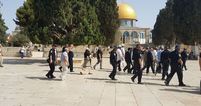
Dozens of Israeli settlers stormed on Thursday morning Jerusalem’s al-Aqsa Mosque—the third holiest site in Islam—via the Maghareba Gate.
Public relations chief at the Islamic Awqaf Department Firas al-Dabes said 71 Israeli settlers, escorted by policemen, and divided into groups showed up at the site and carried out sacrilegious tours.
Israeli police cordoned the plazas of al-Aqsa Mosque at the crack of dawn to secure the break-in.
Israeli police reportedly cracked down on Muslim worshipers at the main entrances to the site.
On Wednesday, the Israeli occupation police banned three Muslim guards from entering al-Aqsa Mosque for two weeks.
Public relations chief at the Islamic Awqaf Department Firas al-Dabes said 71 Israeli settlers, escorted by policemen, and divided into groups showed up at the site and carried out sacrilegious tours.
Israeli police cordoned the plazas of al-Aqsa Mosque at the crack of dawn to secure the break-in.
Israeli police reportedly cracked down on Muslim worshipers at the main entrances to the site.
On Wednesday, the Israeli occupation police banned three Muslim guards from entering al-Aqsa Mosque for two weeks.
10 oct 2018
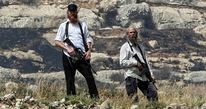
Palestinian residents of the northern West Bank city of Nablus managed on Wednesday to foil an Israeli settler’s attempt to kidnap two children from al-Lubban town south of the city.
Local sources affirmed that an Israeli settler infiltrated into the town and chased two children while playing in the village plain.
Fortunately, local youths managed to save the two children before it is too late.
A state of alert was declared in the town in anticipation of any similar attempt.
Local sources affirmed that an Israeli settler infiltrated into the town and chased two children while playing in the village plain.
Fortunately, local youths managed to save the two children before it is too late.
A state of alert was declared in the town in anticipation of any similar attempt.
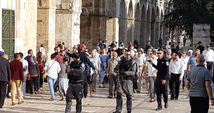
Dozens of Israeli settlers on Wednesday morning forced their way into al-Aqsa Mosque while escorted by a large police force.
Jerusalem's Islamic Awqaf Department said that the Israeli police allowed over 100 settlers to perform Talmudic rituals in the Mosque and tour its courtyards for four hours.
More settlers are expected to visit the Mosque for a one-hour tour following noon prayer, it added.
Israeli settlers on almost a daily basis carry out mass break-ins into al-Aqsa Mosque via al-Maghareba Gate, which has been under Israel's control since 1967.
Jerusalem's Islamic Awqaf Department said that the Israeli police allowed over 100 settlers to perform Talmudic rituals in the Mosque and tour its courtyards for four hours.
More settlers are expected to visit the Mosque for a one-hour tour following noon prayer, it added.
Israeli settlers on almost a daily basis carry out mass break-ins into al-Aqsa Mosque via al-Maghareba Gate, which has been under Israel's control since 1967.
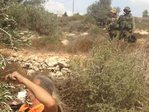
A group of Israeli soldiers, one Israeli policeman, and one Israeli settler harassed a group of Palestinian and international olive pickers in As-Sawiya village yesterday, demanding identification and threatening to expel the harvesters from the area.
Soon after the group began work, they noticed security vehicles from the nearby settlement of Alia arrive and park along the settler road above them.
The occupants of the vehicle got out of the car and stood along the road for some time, taking photographs of the olive pickers.
Soon thereafter, a team of Israeli soldiers arrived, along with an Israeli police officer in an Israeli police vehicle. The soldiers and police officer immediately approached the olive pickers and asked for IDs.
One Israeli soldier filmed the entire interaction with his mobile phone, while the police officer photographed the passports of all the international harvesters. He returned the passports immediately, but held onto the Palestinians’ IDs for a much longer period of time, walking away from the group to make a phone call and visibly sorting through the IDs.
After the phone call, he appeared to photograph one or more of the Palestinian IDs before returning them. The officer then tried to tell the group that they needed to leave. The team refused, with the Palestinians insisting that this was their land and they were there for the olive harvest.
During the confrontation, a settler came and sat nearby, watching. After the confrontation, the settler, along with two Israeli soldiers, remained on the scene for an additional 20-30 minutes, trailing the olive pickers.
Eventually all Zionists left and the rest of the day’s harvest proceeded without incident.
As-Sawiya is slowly being surrounded by Alia as it expands along three sides of the village and encroaches on its land. The particular area being harvested yesterday was among the closest to the Alia settlement.
Soon after the group began work, they noticed security vehicles from the nearby settlement of Alia arrive and park along the settler road above them.
The occupants of the vehicle got out of the car and stood along the road for some time, taking photographs of the olive pickers.
Soon thereafter, a team of Israeli soldiers arrived, along with an Israeli police officer in an Israeli police vehicle. The soldiers and police officer immediately approached the olive pickers and asked for IDs.
One Israeli soldier filmed the entire interaction with his mobile phone, while the police officer photographed the passports of all the international harvesters. He returned the passports immediately, but held onto the Palestinians’ IDs for a much longer period of time, walking away from the group to make a phone call and visibly sorting through the IDs.
After the phone call, he appeared to photograph one or more of the Palestinian IDs before returning them. The officer then tried to tell the group that they needed to leave. The team refused, with the Palestinians insisting that this was their land and they were there for the olive harvest.
During the confrontation, a settler came and sat nearby, watching. After the confrontation, the settler, along with two Israeli soldiers, remained on the scene for an additional 20-30 minutes, trailing the olive pickers.
Eventually all Zionists left and the rest of the day’s harvest proceeded without incident.
As-Sawiya is slowly being surrounded by Alia as it expands along three sides of the village and encroaches on its land. The particular area being harvested yesterday was among the closest to the Alia settlement.

Violent clashes broke out Wednesday morning in Urif town to the south of the northern West Bank city of Nablus.
Head of the village council told PIC reporter that Palestinians were forced to defend their homes after a group of Israeli settlers attacked a number of local homes and a school.
The school was immediately evacuated following the attack, he said.
Israeli forces later arrived to the town and started firing heavy teargas bombs to disperse the locals.
Head of the village council told PIC reporter that Palestinians were forced to defend their homes after a group of Israeli settlers attacked a number of local homes and a school.
The school was immediately evacuated following the attack, he said.
Israeli forces later arrived to the town and started firing heavy teargas bombs to disperse the locals.
|
|
Extremist Israeli settlers assaulted at daybreak Wednesday Qaryout village, south of Nablus, in the northern occupied West Bank, and damaged Palestinian property.
Israeli settlers broke into residential neighborhoods in Qaryout village and slashed tires of several Palestinian cars parked in the area. The Israeli fanatics also spray-painted racist slogans on the walls of civilian homes and car bumpers. The painted graffiti was signed by the racist price tag gangs. |
The majority of Israeli settlers residing in the occupied Palestinian territories frequently engage in acts of violence and staged vandalism against Palestinians.
Settlers' violence includes property and mosque arsons, stone-throwing, uprooting of crops and olive trees, attacks on vulnerable civilians and homes, among others.
Between 500,000 and 600,000 Israelis live in Jewish-only settlements across the occupied territories, in violation of international law.
All settlements across the West Bank are illegal under international law, particularly article 49 of the Fourth Geneva Convention, which establishes that the occupying power shall not deport or transfer parts of its own population into the territory it occupies.
Settlers' violence includes property and mosque arsons, stone-throwing, uprooting of crops and olive trees, attacks on vulnerable civilians and homes, among others.
Between 500,000 and 600,000 Israelis live in Jewish-only settlements across the occupied territories, in violation of international law.
All settlements across the West Bank are illegal under international law, particularly article 49 of the Fourth Geneva Convention, which establishes that the occupying power shall not deport or transfer parts of its own population into the territory it occupies.
9 oct 2018

Dozens of Israeli settlers on Tuesday morning stormed al-Aqsa Mosque under the protection of the Israeli police.
Quds Press reported that 129 Israelis, including tour guides and Jewish students, broke into al-Aqsa Mosque amid heavy police presence.
Israeli settlers on almost a daily basis carry out two rounds of mass break-ins into al-Aqsa Mosque: in the morning and in the afternoon.
Quds Press reported that 129 Israelis, including tour guides and Jewish students, broke into al-Aqsa Mosque amid heavy police presence.
Israeli settlers on almost a daily basis carry out two rounds of mass break-ins into al-Aqsa Mosque: in the morning and in the afternoon.
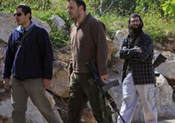
A group of extremist illegal Israeli colonists attacked, Tuesday, many Palestinians while picking their olive trees, in the area between Talfit and Qaryout villages, south of the northern West Bank city of Nablus.
Ghassan Daghlas, a Palestinian official who monitors Israel’s illegal colonialist activities, said dozens of extremist colonists invaded the Palestinian orchards, and attacked many villagers picking their olive trees, in addition to attempting to force them out of their orchards.
Daghlas added that the attack was carried out by more than 150 colonists, who came for a number of illegal colonies and outposts, which were built on private Palestinian lands.
He also stated that such attacks and violations always escalate during the olive harvest season, adding that the latest attack was part of numerous similar assaults this season alone.
It is worth mentioning that the Illegal colonists also frequently pick Palestinian olive trees and steal the produce, in addition to bulldozing and uprooting trees.
Ghassan Daghlas, a Palestinian official who monitors Israel’s illegal colonialist activities, said dozens of extremist colonists invaded the Palestinian orchards, and attacked many villagers picking their olive trees, in addition to attempting to force them out of their orchards.
Daghlas added that the attack was carried out by more than 150 colonists, who came for a number of illegal colonies and outposts, which were built on private Palestinian lands.
He also stated that such attacks and violations always escalate during the olive harvest season, adding that the latest attack was part of numerous similar assaults this season alone.
It is worth mentioning that the Illegal colonists also frequently pick Palestinian olive trees and steal the produce, in addition to bulldozing and uprooting trees.
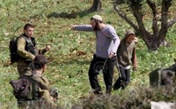
A group of illegal Israeli colonist settlers invaded, on Tuesday morning, Palestinian agricultural lands in Bruqin village, west of Salfit in northeastern West Bank, and uprooted 39 olive and almond trees owned by a Palestinian farmer.
Bashir Salama, the head of Bruqin Local Council, said the Israeli assailants invaded lands, owned by a local farmer identified as Jamal Othman Salama, before cutting and uprooting 39 olive and almond trees.
The invaded Palestinian lands are near the illegal Brokhin colony, close to bypass road #446.
The farmer, Jamal Salama, said that, in 2011, the Israeli colonizers cut and burnt 200 olive trees, and uprooted 40 olive saplings in 2017, to install water pipelines for their illegal colonies, built on private Palestinian lands.
It is worth mentioning that the illegal colonizers have cut, uprooted and burnt nearly 5000 trees, mainly olive trees, owned by several farmers, since the beginning of this year.
Israel’s colonies in the occupied West Bank, including in and around occupied East Jerusalem, are illegal under International Law and the Fourth Geneva Convention.
Bashir Salama, the head of Bruqin Local Council, said the Israeli assailants invaded lands, owned by a local farmer identified as Jamal Othman Salama, before cutting and uprooting 39 olive and almond trees.
The invaded Palestinian lands are near the illegal Brokhin colony, close to bypass road #446.
The farmer, Jamal Salama, said that, in 2011, the Israeli colonizers cut and burnt 200 olive trees, and uprooted 40 olive saplings in 2017, to install water pipelines for their illegal colonies, built on private Palestinian lands.
It is worth mentioning that the illegal colonizers have cut, uprooted and burnt nearly 5000 trees, mainly olive trees, owned by several farmers, since the beginning of this year.
Israel’s colonies in the occupied West Bank, including in and around occupied East Jerusalem, are illegal under International Law and the Fourth Geneva Convention.
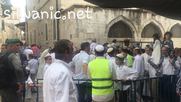
A horde of extremist Israeli settlers scoured on Monday the streets of Jerusalem’s Old City, marking the advent of the Jewish New Year.
Thousands of Israeli fanatics flocked to Sheikh Jarah neighborhood and toured the Old City, before they gathered in the Buraq Wall. video
Israeli police closed off the access road to Sheikh Jarah and blocked Palestinians’ access to their homes.
Heavily-armed policemen showed up in the area to protect the Israeli fanatics.
Tuesday marks the beginning of the new Hebrew month for the 5779 year, according to the Jewish calendar.
Thousands of Israeli fanatics flocked to Sheikh Jarah neighborhood and toured the Old City, before they gathered in the Buraq Wall. video
Israeli police closed off the access road to Sheikh Jarah and blocked Palestinians’ access to their homes.
Heavily-armed policemen showed up in the area to protect the Israeli fanatics.
Tuesday marks the beginning of the new Hebrew month for the 5779 year, according to the Jewish calendar.
